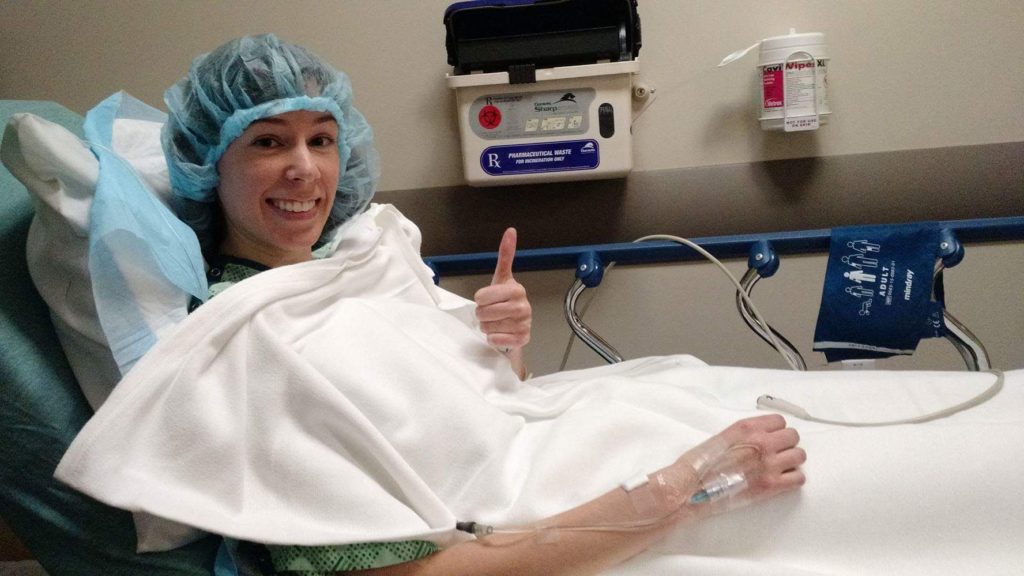Ah, August of 2014. It was the summer I transferred to William Jessup University—a small, humble school on the outskirts of Rocklin, California.
I had always dreamt of attending a large university after my two years at a cramped and overcrowded community college—someplace where I could continue to appease my inner introvert and hide camouflaged amongst the masses. But the charming intimacy of William Jessup tugged at my soul, beckoning me to get involved, stand for something, become someone who others would want to get to know.
So I began my junior year at Jessup excited, passionate, ready to finally choose to be bold and no longer a captive to my innate and authoritative wallflower character. I was finally living away from home in an apartment of eight awesome girls and pursuing my business degree…I was in a state of elation.
But as you may have guessed when clicking on this post, things did not stay this way.
My Ulcerative Colitis Symptoms
Without warning, one hot morning in September—just after a month of starting at Jessup—I felt sick.
Not flushed and weak like the flu.
Not sweating and upchucking from food poisoning.
Not in need of a heating pad for period cramps.
No. My stomach had never experienced this indescribable pain. My belly felt heavy like a bowling ball, yet thin as tissue paper with knives searing through. I immediately knew something was wrong.
I knew because I found myself quite literally running to the bathroom at least twenty times a day.
I knew because there was so much blood in my stool that it put my menstrual cycle to shame.
I knew because the pain became worse and the calls to the bathroom became stronger every time after I ate.
I knew.
Trying to Figure Out What Was Wrong
I don’t have time for this, I thought to myself. I didn’t have the time to devote chunks of thirty minutes or more on the toilet. I didn’t have the time to be forced to find a bathroom at the onset of ruthless and spontaneous intestinal pains. Between classes, studying, work, and my social life, the fear of when the next bout would strike was almost as bad as the pain itself.
Obviously wanting to get to the bottom of this mysterious and equally uninvited situation, I visited two local urgent care centers that week. Get this: both told me I was fine.
They said that pain in my belly and blood in my stool was “normal” and that it will “go away in a few days.” (WHAT?) Incredulously, I waited a couple of days, but as I anticipated there was no change. It was the same pain, just gaining strength and fervor.
Meeting My Gastroenterologist
That’s when I visited my general practitioner and he told me to see a gastroenterologist. Immediately. I thought I detected some worry in his normally calm voice. (As if I wasn’t already afraid!)
He referred me to an amazing gastroenterologist in Sacramento (Dr. Yinka Davies at Sacramento Pediatrics Gastroenterology, if you’re local!) She gave me hope throughout the next few hectic months. She scheduled me for countless appointments, blood tests, a colonoscopy and endoscopy, and various medications to get to the bottom of this bloody and excruciating inconvenience.
Starting Prednisone
She also promptly placed me on a medication called prednisone—which is a story in itself in another blog post—that reduced my colon’s inflammation and temporarily tamed my symptoms. This high dose of prednisone gave me momentary relief, holding me over until my eventual diagnosis and its long-term solution.
However, during this time of limbo came the corresponding fear of the unknown.
Not only was I missing many of my classes for these appointments, but I was constantly worried. Worried I’d do poorly in my classes. Worried about where I’d be during the next unpredictable bathroom call. And to top it all, several months of testing with no diagnosis was eating at my mind…
Finally, in September 2014, I was officially diagnosed with ulcerative colitis—an autoimmune, inflammatory bowel disease (IBD).
That same day, my gastroenterologist prescribed me six medications at once:
some to calm my inflamed intestine,
some to destroy interrelated stomach ulcers,
and others to promote the growth of good bacteria in my gut.
How my IBD Diagnosis Impacted my Day-to-Day Life
I won’t lie. The following days, weeks, and months were rough. I got behind in my classes. I retreated from my newfound boldness back into my old and familiar introverted cage. I imagine my roommates wondered why I was talking to them less and hiding away in my dark room more.
A part of this was because of my fear of what was going to happen to me and my insides, but the bigger reason for my retreat was due to fatigue and the side effects of the medications.
But as the semester progressed, I was able to process my diagnosis. And with the help of my roommates who didn’t give up on me and continuously prayed for me, and with the constant hilarity that my then-boyfriend, now-husband, Tyler, brought into my darkest moments, I came to acceptance with my “new normal.”
You Are Not in This Alone
I’m going to ruin the ending for you, because spoiler alert: over time, things get better. Over the course of 2014 to now, I’ve grown, laughed till I’ve cried, and overcome roadblocks that ulcerative colitis has thrown my way.
Let me wrap up this chapter by saying that it’s okay to admit you’re afraid. It’s okay to face your IBD and not be completely fearless. You don’t have to be. Take your time to process. Take your time to accept.
With the surprise of a chronic illness diagnosis, it’s not uncommon to feel alone.
But. You’re. Not.
I’ve been there. And things will get better. Your diagnosis story will mature into an acceptance story.
Related Posts
